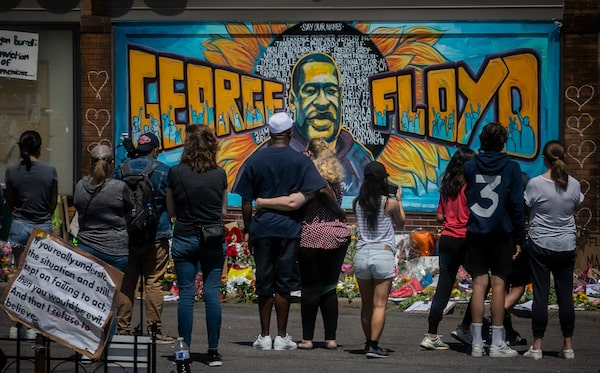
People visit a memorial featuring a mural of George Floyd, near the spot where he died while in police custody, in Minneapolis, Minn., on May 31, 2020.Bebeto Matthews/The Associated Press
A federal judge sentenced former Minneapolis police Officer Thomas Lane to 2 1/2 years in prison Thursday for violating George Floyd’s civil rights, calling Mr. Lane’s role in the restraint that killed Mr. Floyd “a very serious offence in which a life was lost” but handing down a sentence well below what prosecutors and Mr. Floyd’s family sought.
Judge Paul Magnuson’s sentence was just slightly more than the 27 months that Lane’s attorney had requested, while prosecutors had asked for at least 5 1/4 years in prison – the low end of federal guidelines for the charge Mr. Lane was convicted on earlier this year. He said Mr. Lane, who faces sentencing in September on state charges in Mr. Floyd’s killing, will remain free on bond until he must turn himself in Oct. 4.
Mr. Lane, who is white, held Mr. Floyd’s legs as Officer Derek Chauvin pinned Floyd’s neck with his knee for nearly 9 1/2 minutes on May 25, 2020. Bystander video of Mr. Floyd, who was Black, pleading that he could not breathe sparked protests in Minneapolis and around the world in a reckoning over racial injustice over policing.
Two other officers, J. Alexander Kueng and Tou Thao, were also convicted of violating Floyd’s civil rights and will be sentenced later.
Floyd family members had asked Justice Magnuson to give Mr. Lane the stiffest sentence possible, with brother Philonise Floyd rejecting the idea that Mr. Lane deserved any mercy for asking his colleagues twice if George Floyd should be shifted from his stomach to his side.
“Officer Lane did not intervene in one way or another,” he said.
Prosecutor Manda Sertich had also argued for a higher sentence, saying that Mr. Lane “chose not to act” when he could have saved a life.
“There has to be a line where blindly following a senior officer’s lead, even for a rookie officer, is not acceptable,” she said.
Justice Magnuson told Mr. Lane the “fact that you did not get up and remove Mr. Chauvin when Mr. Floyd became unconscious is a violation of the law.” But he also held up 145 letters he said he had received supporting Mr. Lane, saying he had never received so many on behalf of a defendant. And he faulted the Minneapolis Police Department for sending Mr. Lane with another rookie officer on the call that ended in Mr. Floyd’s death.
Justice Magnuson cited two letters in particular that he said came from doctors who recounted a situation when their diagnosis was overruled by a more senior physician, “to disastrous result to the patient.” He said the doctors described being haunted that they did not stand up to the senior physician.
“It speaks loudly to this case,” Justice Magnuson said.
In sentencing Mr. Chauvin earlier this month on civil rights charges in Mr. Floyd’s killing, Justice Magnuson appeared to suggest that he bore the most blame in the case, telling Mr. Chauvin: “You absolutely destroyed the lives of three young officers by taking command of the scene.”
Mr. Lane did not speak at Thursday’s sentencing and neither he nor his attorney, Earl Gray, commented to reporters afterward. Prosecutors did not immediately comment afterward, but Philonise Floyd called the sentence “insulting” and said he didn’t understand why Mr. Lane – whom he called “an accessory to murder” – didn’t get the toughest possible sentence.
“To me I think this whole criminal system needs to be torn down and rebuilt,” he said.
Our Morning Update and Evening Update newsletters are written by Globe editors, giving you a concise summary of the day’s most important headlines. Sign up today.